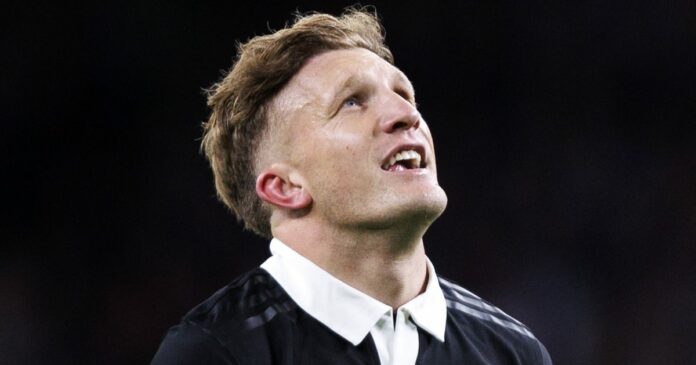
[ad_1]
Last Saturday, after Mark Tele’a carried several English players on his back en route to a blockbuster try in the right corner, Damian McKenzie lined up the touchline conversion to nudge New Zealand ahead in the match with four minutes to play.
Just then, three large words were emblazoned on the big screen at Twickenham; Respect The Kicker.
Of course the English faithful inside the self-anointed Home of Rugby obliged. Actually, no, they didn’t. Quite the opposite in fact. They whistled and jeered, doing their best to put McKenzie off his stride. These English fans, who had provided near total silence whenever Marcus Smith or George Ford took aim at the poles, ignored the directive and chucked out convention as they ratcheted up their menace.
This was a good thing and hopefully puts to bed the antiquated and pompous notion that this sport we love is somehow above a bit of pantomime nastiness. Respect the kicker? When a Test is on the line? When a visiting player is about to beat your country on your own patch? As if!
Springbok coach Nick Mallett reveals what makes Rassie Erasmus so special | RPTV
Former Springbok coach and now television analyst Nick Mallett reveals what makes Rassie Erasmus so special. Watch Boks Office on RugbyPass TV now
Watch now

Springbok coach Nick Mallett reveals what makes Rassie Erasmus so special | RPTV
Former Springbok coach and now television analyst Nick Mallett reveals what makes Rassie Erasmus so special. Watch Boks Office on RugbyPass TV now
Watch now
This pearl clutching plea espoused around the world has its roots in rugby’s ancient past. Rugby Values (always capitalised) were born in the Victorian era where middle class English lads in posh schools were educated on merits of Corinthian ideals. Where proper conduct on the pitch translated to proper conduct across the empire, whether that was running a tea plantation in Ceylon or murdering natives on the battlefield in Sudan.
Showing deference to the referee, playing hard but fair, refusing to win through underhanded tactics; this was what it meant to be English. This is what it meant to be a rugby player.

Ireland

New Zealand
Of course, this is all a facade, a lie that turned into legend. The British did not establish the largest empire in human history through gentlemanly conduct. The same is true for rugby, where matches, since the very first, have been won thanks to cheap shots, players in offside positions and blatantly forward passes. At every level there are high tackles and late shots, tussles off the ball and foul words exchanged.
So why the insistence on ramming Rugby Values down our throat? Again, this stems from an earlier age. With the sport’s classist history, where only affluent amateurs could afford to risk their brains and bones for no pay, union’s bosses and marketers positioned the code against league and football. Especially football, where mostly working class fans have long been derided by the rich and powerful. As Oscar Wilde is supposed to have said, “football is a game played by ruffians”. Contrast this with the quote attributed to Winston Churchill – “rugby is a hooligan’s game played by gentleman” – and a clear image emerges.
This isn’t all bad, nor is it founded entirely in myth. One of rugby’s best qualities are those so-called virtues that insist on respect for the referee, a handshake after a bloody game and beers shared by players who only minutes earlier were tearing lumps out of each other. If this side of the game were to disappear entirely the whole enterprise would be poorer for it.
But let’s not pretend that deferential silence as a fly-half attempts a match-winning kick is the answer. Not only is it not practical – as those noisy fans at Twickenham proved – it actually cheapens the spectacle.
Two years ago, when the Springboks played France in Marseille 12 months out for the World Cup, the Velodrome was a teeming, heaving swirl of light and sound. Just about every Springbok who played in that 30-26 defeat – that incidentally saw two former World Rugby Player of the Year recipients red-carded – said that it was one of the most vibrant atmospheres they’d ever experienced.
And did the French partisans keep quiet when Chesline Kolbe, Faf de Klerk and Damian Willemse teed up the ball? Of course not! They raised their voices and hurled abuse down from the enveloping stands. And even though I was there as a neutral journalist, I couldn’t help but feel a chill and the sudden urge to shout down support for my fellow Saffas who cut lonely figures down on the pitch. I didn’t, of course. I’ve always been able to maintain a degree of professionalism in the press box. But the hostility directed at my compatriots stirred something deep within me. Something primal and prickly and uncontrollable.
And isn’t that the point of all this? Isn’t international sport supposed to be theatre that flirts with jingoism and violence? Orwell said that sport was war minus the shooting. This was meant as a criticism and there are times when passions run over and become toxic. (I’ve read the comments sections under some of my articles. I know exactly how ugly fandom can be).
But if this fervour can hold the line, if it remains on the right side of nationalism, everyone wins. The circus has meaning. The entertainment has jeopardy. It gives fans something to talk about and, perhaps most importantly, doesn’t hold them to unrealistic standards of behaviour. Let them shout! Let them boo! Let them whistle and jeer! If McKenzie or any other kicker needs absolute silence to split the uprights then they don’t belong at the elite level anyway.
So as we kick-off the Autumn Nations Series in earnest tonight, with all teams involved over the weekend, let’s dispense with the faux humility. If you’re an Irish fan at the Aviva, don’t be afraid to clear your lungs and let every All Black attempting to put points on your boys know exactly how you feel. Same for the Scots in Edinburgh, the English in Twickenham and the Welsh in Cardiff. Away fixtures are supposed to be challenging. They’re supposed to be unequal. Why pretend otherwise?
[ad_2]
Copyright for syndicated content belongs to the linked Source link

